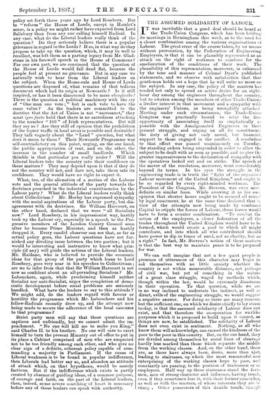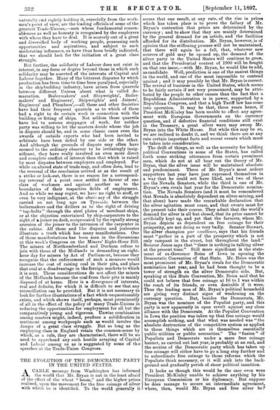THE ASSUMED SOLIDARITY OF LABOUR.
IT was inevitable that a good deal should be heard at the Trade-Union Congress, which has been holding its meetings in Birmingham this week, as to the need for a closer combination among the various organisations of Labour. The great error of the course taken, by no means without provocation, by the Federation of Engineering Employers, is that it can be plausibly represented as an attack on the right of workmen to combine for the amelioration of the conditions of their work. The plausibility of this representation, moreover, is enhanced by the tone and manner of Colonel Dyer's published statements, and we observe with satisfaction that that gentleman holds out a hope that he will write no more on the subject. In any case, the policy of the masters has tended not only to spread an active desire for an eight- hour day among the engineers throughout the country, but to awaken among the members of other Trade-Unions a livelier interest in that movement and a sympathy with the engineers' Unions, as being wrongfully attacked Meeting under such circumstances, the Trade-Union Congress was practically bound to seize the first, opportunity of associating itself as emphatically as possible with the Amalgamated Engineers in their present struggle, and urging on all its constituent!: the duty of giving not only moral, but financial, support to those engaged in the conflict. A resolution to that effect was passed unanimously on Tuesday, the standing orders being suspended in order to allow the subject to be dealt with as soon as possible, and to give the, greater impressiveness to the declaration of sympathy with the operatives locked out and on strike. The speech of the mover of the resolution, moreover, went considerably beyond its terms. In his eyes the struggle in the engineering trade is in truth the "fight of the organised Labour movement of the United Kingdom," and ought tc be so regarded by every right-minded workman. The President of the Congress, Mr. Stevens, was even morr definite on similar lines. While avowing it as his ow i. opinion that shorter hours ought to be secured all rouni1 by legal enactment, he at the same time declared that in view of the attempts now being made by combined Capital to cripple the forces of Labour, those forces would have to form a counter combination. "To combat the action of the employers, a closer federation of all the trades throughout the United Kingdom would have to be formed, which would create a pool to which all might contribute, and into which all who contributed should have power to dip in times of need, not as charity, but as a right." In fact, Mr. Stevens's notion of these matters is that the best way to maintain peace is to be prepared for war.
We can well imagine that not a few quiet people in presence of utterances of this character may begin to ask themselves with no little anxiety whether the country is not within measurable distance, not perhaps of civil war, but yet of something in the nature of a great Class struggle, waged by methods which, though within the law, would be extremely disastrous in their operation. To that question, while we are in no way inclined to underrate the indirect, as well as direct, evils of the engineering struggle, we would suggest a negative answer. For doing so there are many reasons, but the sufficient one, on which we desire chiefly to lay stress to-day, is that the assumed solidarity of Labour does not exist, and that therefore the co-operation for warlike purposes which it is proposed to build upon it cannot, as things are now, be established. The solidarity of Labour does not even exist in sentiment. Nothing, as all who know them will acknowledge, can exceed the kindness of the poor to the poor in this country. But, on the one hand, they are divided among themselves by social lines of cleavage hardly less marked than those which separate the middle from the working classes. And, on the other hand, there are, as there have always been, doors, more than ajar, leading to staircases, up which the most resourceful and enterprising of the working classes hope to pass, and constantly are passing, to the position of tradesmen or 01. employers. Half way up these staircases stand the fore- men, men of strong character and influence, having touch,' even if they sometimes lose it, with their former comrades, as well as with the masters, of whose interests they are in charg-. Other possessors of this double touch. though naturally and rightly holding it, especially from the work- men's point of view, are the leading officials of some of the greatest Trade-Unions,—men whose fundamental reason- ableness as well as honesty is recognised by the employers with whom they have to deal. It is scarcely out of a great and diversified body of working people, possessing such opportunities and aspirations, and subject to such moderating influences, as have thus been briefly indicated, that we should look for the initiation of a great class struggle.
But further, the solidarity of Labour does not exist in interest, in any form or degree beyond those in which such solidarity may be asserted of the interests of Capital and Labour together. Many of the bitterest disputes by which production has from time to time been paralysed, especially in the shipbuilding industry, have arisen from quarrels between different Unions about what is called de- marcation. Boilermakers' and Shipwrights', Boiler- makers' and Engineers', Shipwrights' and Joiners', Engineers' and Plumbers',—all these and other Societies have had their frequent quarrels as to which of them had a right to do certain work in connection with the building or fitting of ships. Not seldom those quarrels have led to serious stoppages of work, for neither party was willing to let the masters decide whose the job in dispute should be, and in some classic cases even the awards of outside experts who had been invited to arbitrate have been defied by one side or the other. And although the grounds of dispute may often have seemed to the ordinary observer to be irritatingly insig- nificant, they have really involved an even more direct and complete conflict of interest than that which is raised by most disputes between employers and employed. For while an altered state of trade may, and often does, lead to the reversal of the conclusion arrived at as the result of a strike or lock-out, there is no reason for a correspond- ing reversal of a point once settled in favour of one -class of workmen and against another as to the boundaries of their respective fields of employment. And so while we may regret, we have no right to scoff, or even be very indignant, at the obsticacy of the struggle carried on not long ago OR Tyneside between the boilermakers and the drillers as to the right of driving " tap-bolts " through the steel plates of merchant ships, or at the objection entertained by ship-carpenters to the sight of a joiner on deck, reciprocated by the equally strong aversion of the joiner to the intrusion of the carpenter in the cabins. All these and like disputes and jealousies illustrate a truth which has many manifestations. One of those manifestations has been seen in the discussions at this week's Congress on the Miners' Eight-Hour Bill. The miners of Northumberland and Durham refuse to join with those of the Midlands in demanding an eight- hour day for miners by Act of Parliament, because they recognise that the enforcement of such a measure would increase the cost of raising coal in their pits, and place that coal at a disadvantage in the foreign markets to which it is sent. These considerations do not affect the miners of the Midlands because the coal from their pits is mainly disposed of at home. Here is a divergence of interests, real and definite, for which it is difficult to see that any reconciliation can be provided. But it is not necessary to look for further illustrations of a fact which unquestionably exists, and which shows itself, perhaps, most prominently of all in the effect of the policy of many Trade-Unions in reducing the opportunities for employment for all but the comparatively young and vigorous. Unwise combination among masters might, indeed, produce a solidification in sentiment among workpeople such as would involve the danger of a great class struggle. But so long as the employing class in England retain the common-sense by which, as a rule, they are characterised, there will be no need to apprehend any such hostile arraying of Capital and Labour among us as is suggested by some of th e speeches at the Trade-Union Congress.



































 Previous page
Previous page